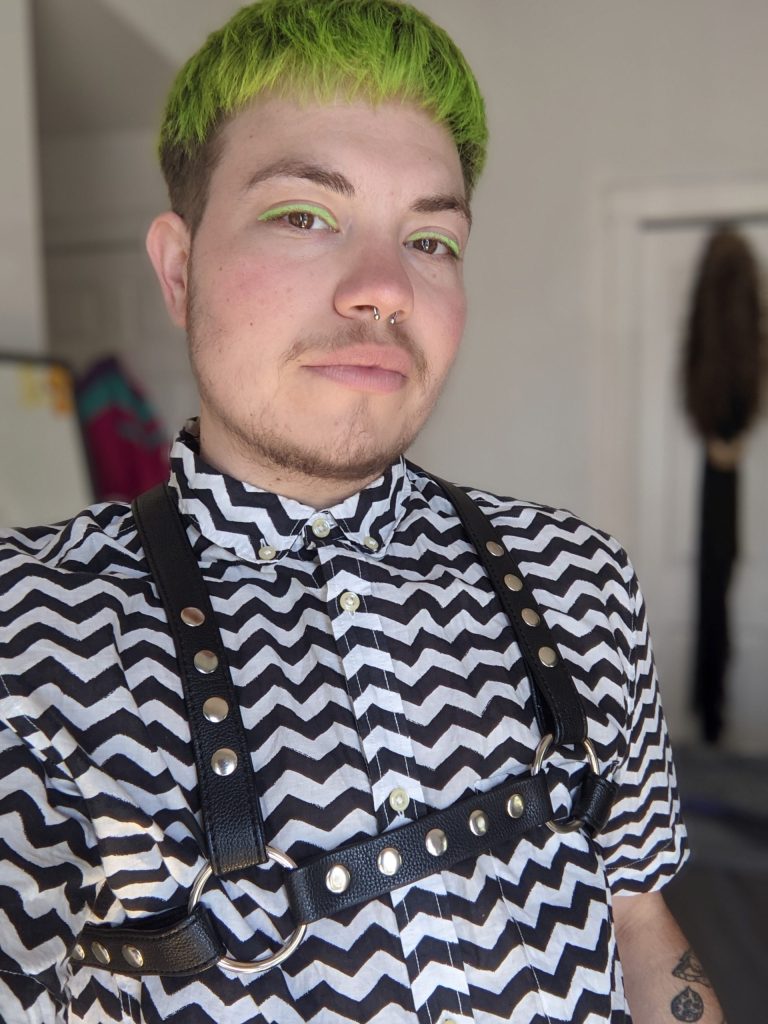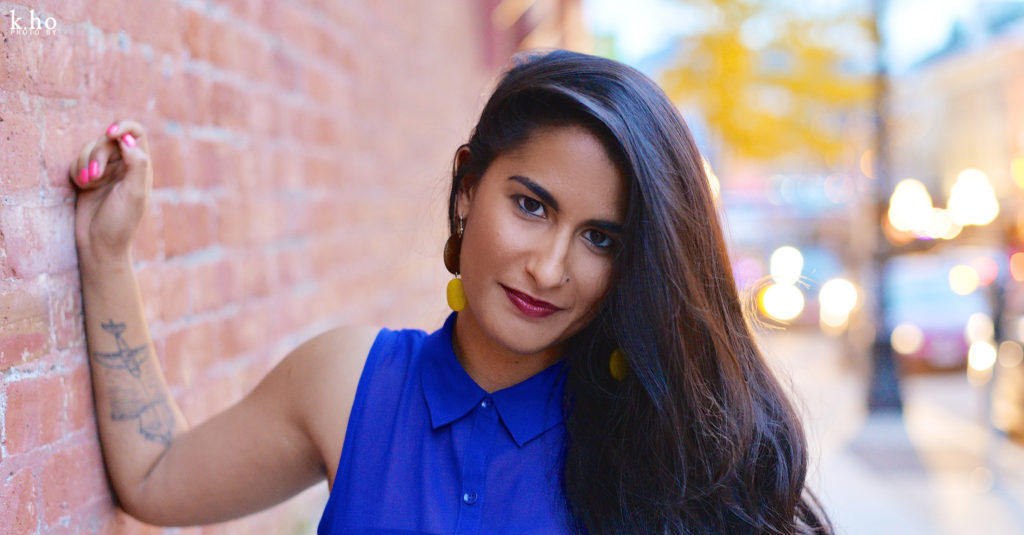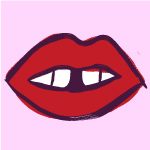Our city is bursting with queer talent — folks who are deeply committed to changing the landscape of arts and culture in this city to be more inclusive, more thoughtful, and more safe, and a heck of a lot more fun.
Finn Parkes (Public Disco, Vancouver Mural Festival) and Anoushka Ratnarajah (Out on Screen, Vancouver Queer Film Festival) are two changemakers who are shaking up their respective industries.

Finn Parks
@finnnparkes
Pronouns: They/them
Tell us about your work!
I am a freelance creative, cultural producer and community advocate that wears many hats. I’m a project manager and curator for Public Disco, an organization ran by my creative partner Nickolas Collinet and I. [It] started as a daydream in the park many moons ago and now we pop up large scale public dance parties in underutilized public spaces.
Currently, I am being contracted by Music BC to facilitate educational initiatives and am producing a six-part Community Discussion Series tackling racism, ableism, representation of 2SLGBTQIA+ and BIPOC artists, youth and all ages events, and accessibility within the music industry and ecosystem in BC.
We have been mentored and adopted by the fine folks at Vancouver Mural Festival (VMF) over the past six years. Their support contributed to us being able to make Public Disco come to life. I am a project manager and programming coordinator for VMF, my current project being the Pop Up Patio for this Summer. Building off of what we did last year, we’ve introduced a Curator Development Program that I am facilitating and creating with our team with the goal of supporting and building the capacity of underrepresented and newer curators. I feel strongly about knowledge sharing and mentorship and I am grateful to be in a position to connect with new folks and help them to develop their projects and ideas utilizing our stage and resources. It’d be easy to curate everything ourselves, but the whole point is to connect communities and with one another. How better to do that than to mentor folks into creating something beautiful for their own unique communities? That’s really special and felt in the environments they create. I truly love the work I do and am grateful everyday to be able to do it.
Outside of those main gigs I do a lot of educating and advocacy utilizing my Instagram platform, modelling campaigns as well as my position within the music industry to leverage and push for changes.
What makes your organization special?
Simply put, it’s queer run and community focused. We prioritize building authentic relationships with those in our community and breaking down barriers for those with less access opportunity. I truly feel like I can be myself and have a lot of creative freedom and support, especially as I’m currently transitioning and have different needs and capacity. My neurodivergent ways of thinking and creating are celebrated and supported. Flexibility is important for me to be able to give my best and being able to work from home at any hour is a blessing. Working with people who share the same values as myself and are constantly evolving and looking at ways to positively impact those around them is imperative to my happiness. Having the same mission and caring about one another on a human level is really important to me in the work that I do and just in my life in general.
What inspired you to start this venture?
A giant gaping gap in the scene and my life. Most of the organizations/projects I’ve been a part of or developed all revolve around genuine, community connection and social justice. Making change, but somewhat indirectly or subtle. Public Disco looks like a free, big dance party where you can drink outside. We see it as an opportunity to give stage to lesser known artists and to queer the streets with our curation of environment, artists we showcase and art we feature. Incorporating Drag Hosts instead of MCs, glitter, etc. Very approachable and fun.
Vancouver can be a very cold city, even being from here I struggled to meet people and form authentic relationships with. We started organizations and projects out of a desire to make friends and have a community of like minded people. And a mix of folks. There’s a lot of people doing strictly events and running spaces for queer community and its great and so needed. We like to take a different approach and build off of that by encouraging mixed spaces and intermingling of people. We agree separation is needed for safety and comfort in many situations, but there needs to be an opportunity for folks to connect with those who are different from them in a comfortable and open environment. You can’t always get that at workplaces and often folks spend time with those similar to them. We see these events and pop ups as opportunities to invite folks to connect with one another organically, to meet your neighbours and build meaningful relationships.
How do you support the queer community in your work?
The majority of my projects are queer-focused or are from a queer lense. I am always looking at ways to uplift our community and support through different types of projects I involve myself with. Mental illness and trauma is rampant in our community, and something I’ve struggled with most of my life. It’s important to remember the impact of mental health when considering community, folks from marginalized communities especially rely on community and events to connect with one another, to feel seen. I myself did not truly understand myself until I saw what was reflected back at me through queer events and friendships. A lot of us truly blossom in these environments.
Events and queer community is something incredibly important and impactful. The brutal reality is that a lot of us do not have family or support networks that love and accept or respect us. We find our chosen family often on the dancefloor and within queer community. Vancouver is also seen as a cold city, hard to make genuine connections and can be even more detrimental to queer and trans youth.
How are you decolonizing and instilling anti-racist practices into your work/workspace?
Decolonizing music industry spaces and scenes by emphasizing community building and supporting one another. Working towards dismantling structures that perpetuate the status quo and addressing unbalanced power dynamics (ex. getting involved with being on JUNOS committees in order to stir things up and advice adjustments from within the system). Connections always over networks. Power sharing, constantly learning and unlearning, reading and working through my own internal biases when they come up, taking Decolonize Now workshops, actively speaking to community members directly, consultations, acting as a bridge or translator between bureaucracy and arts/community to facilitate more projects and folks being supported financially. Reparations of course.
Being always open and thankful for feedback, leading with compassion and understanding, listening. No one size fits all and addressing folks’ needs on a time by time basis. Meeting them where they’re at.
The core of my work is values based and people centred. My passions lie in doing meaningful work that positively impacts my communities that causes a ripple effect. I’ve been doing this work on a volunteer basis for many years because I love it and genuinely care about making shifts in society. I am grateful to make a career out of work like this.
How did you & your organization/business adapt to the changes brought on by COVID-19?
At the beginning of COVID I was working full time in a construction job that wasn’t a good fit. Up until recently I have always had a full time job and done projects and community work in my spare time. COVID actually pushed me to freelance and do creative and community focused work full time.
For Public Disco, we pivoted all of our events into video projects which were very fun. I had never produced video content before so it was a fun challenge and something I’m grateful to have had the experience to do. From that experience, I’ve been able to help others pivot their projects or produce video events for those lacking production skills.
For VMF, instead of our annual Mount Pleasant Street Party we pivoted to a three- week long Pop Up Patio event and was one of the only city sanctioned events in Vancouver last year. We worked long hours day and night to put that together for the community and collaborated with outside curators who had lost all performing opportunities due to COVID. It was an incredible experience and very emotional to witness folks gracing a stage for the first time in over six months.
What has been your greatest challenge during the pandemic?
I began my gender transition at the beginning of the pandemic, diagnosed with ADHD and came to terms with being autistic. Due to the latter, being at home has actually been really great for me. It’s been a really challenging year in many ways. A lot of heartbreak, loneliness as I’m sure we have all felt. I came into myself more than I ever have during this pandemic and am grateful I had the opportunity to transition mostly at home.
Biggest challenge for me would be isolation and mental health. I went from being incredibly social all of the time to spending 80 per cent of my time alone. I realized a lot of things about myself this past year, I’m more introverted than I initially thought. Having the time away to refocus has been great and honestly has given me so much inspiration for the future.
It’s been hard to not be able to see family and friends, I’m a very physically affectionate person so that’s been a big challenge for me.
What’s one thing you’ve learned over the past year that you want people to know?
How to slow down and appreciate what I have, the body I’m in. Those around me that love me. I’ve learned how my brain works suddenly after 30 years and it’s causing me to unmask a lot of neurotypical traits and engage with folks slightly differently. But it feels better and I want to openly be myself and be proud of that. Be proud of who I am and how I’ve gotten to this place.
This Pride (and beyond) how can the community show up for queer folks?
Pay us. Hire us. Buy our shit. Queers often make less money than their straight counterparts and have less job opportunities due to unsafe environments. Step up your workplace and make it safer for us. If you want to actually support a community do it all year round and not just during a pride month. Learn about microaggressions and speak up for us.
When you’re not working, you are:
Sleeping. Riding my bike, hosting brunch club and cooking for everyone, relaxing and reading.

Anoushka Ratnarajah
Pronouns: She/Her/Hers
Tell us about your job/business/role
I’m the Artistic Director at Out On Screen, which produces the annual Vancouver Queer Film Festival and runs the province-wide Out In Schools program. Out On Screen proudly showcases films that illuminate transformative moments in the lives of queer, trans, and two-spirit people — telling the stories of the journeys we’ve taken to find ourselves, each other and our place in the world. Every time we take a seat at the Festival or in an Out In Schools presentation, we experience the difference we’re making: creating social change through film, education and dialogue. This year the Festival is in it’s 33rd year and will run online from Aug 12-22, 2021.
How do you support the queer community in your work?
Every year we bring stories created by and about queer people from all over the world to our communities here in Vancouver. We believe in the transformative and affirmative power of film, and I know how important authentic and equitable representation is to our communities. I know that my work is meant to serve many different and intersecting queer communities, and I work with a dedicated and supportive team to ensure we create a Festival that offers many different kinds of queer stories.
How are you decolonizing and instilling anti-racist practices into your work/workspace?
Decolonization and anti-racism will always be an inherent part of my work as a queer woman of colour, because white supremacy and colonialism directly affect me and most of the people I love. It’s also an on-going learning process, and one that will last for my whole life. I am fortunate and privileged to get to work alongside and in witness of artists who are also doing the difficult work of decolonizing their own arts practices. I learn so much from them. I think the most important thing for me is to remain open to unlearning old ways of doing things, and allow creativity and collaboration to drive new ways of curating.
How do you celebrate or acknowledge Pride?
It feels like the whole summer is just one long stretch of Pride, starting in June and moving through to August when our Festival takes place. I always enjoy the opportunity that Pride creates to connect with friends and community, and I love seeing queer artists being uplifted and shining. I also appreciate that Pride is often a time when we reflect on our shared histories and create opportunities to have intergenerational conversations, opportunities for connectedness and solidarity, and conversations about what our shared futures might look like.
This Pride (and beyond) how can the community show up for queer folks?
I think one really concrete way to show up for queer folks, no matter your relationship to our diverse communities, would be to support the work of queer artists. Seek out queer books and films to move and educate you. Fill a blank spot on a wall with the work of a queer visual artist. Listen to music by queer musicians. Go see some queer theatre or dance. The pandemic has hit queer artists very hard, so if you have extra funds during this difficult time, I reccommend putting some investment into your local queer arts scene!




